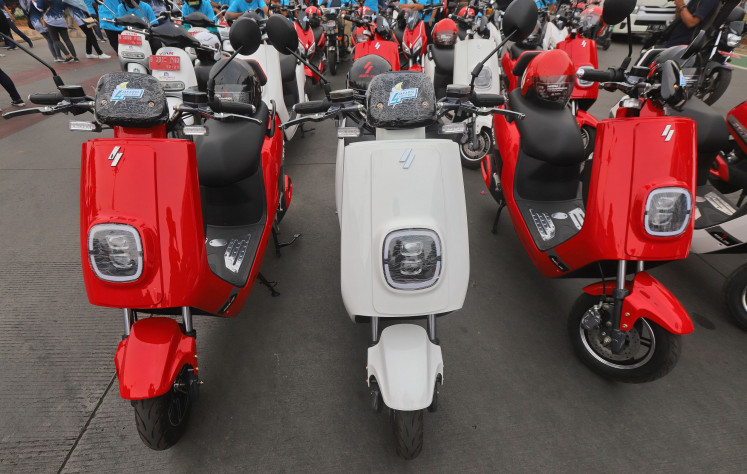Will Jakarta become the Brussels of the East?
On Jan
Change text size
Gift Premium Articles
to Anyone

O
n Jan. 1, Vietnam assumed the chairmanship of ASEAN for 2010. As ASEAN foreign ministers concluded their meeting last week in the coastal Vietnamese city of Da Nang to demonstrate and discuss the physical connectivity of the region, Indonesia should contemplate another kind of connectivity about its place in the world.
We can start this process by asking, can Jakarta become the Brussels of the East?
Indonesia has been host to the ASEAN Secretariat since 1967. It was the late president Soeharto who had the foresight to establish the headquarters in Jakarta under an agreement between the government of Indonesia and ASEAN relating to the privileges and immunities of the ASEAN Secretariat of Jan. 20, 1979.
The coming into force of the ASEAN Charter on Dec. 15, 2008, has strengthened the position and relevance of ASEAN as a rules-based organization, both in the regional and international arenas.
Thirty countries, and counting, have so far appointed their own ambassadors to ASEAN; these include the United States, China, Japan, India and the European Union. These countries, together with the 10 ASEAN member states, have established or will establish their own permanent missions in Jakarta.
As interest in ASEAN grows, so too will the number of permanent missions. These developments can only benefit ASEAN's centrality and Indonesia's primary role as a member and host of ASEAN.
In recent years, ASEAN has played a more active role in the political economy of the world, especially in East Asian community building. ASEAN remains, as US President Barack Obama said, "a trusted partner" in international affairs. This can be reflected in the accession of 16 non-ASEAN member states to the Treaty of Amity and Cooperation (TAC) of ASEAN.
Interest is rising among more distant countries in Africa, Latin America and the Middle East. Recently, the Indonesian Embassy in Beirut held a full-house seminar on ASEAN for Middle East and Central Asian states.
All these countries know that an increasingly self-aware, confident, prosperous and independent ASEAN will be good for global growth and security.
This "new" ASEAN, as a platform of fresh opportunities, emphasizes how important Indonesia has become as the host country of the ASEAN headquarters.
It is undeniable that the presence in Indonesia of ASEAN citizens and dialogue-partner citizens, including experts, has brought, and will continue to bring, huge financial benefits to the Indonesian economy. It will also shape Indonesia's changing role within the region and the entire world.
These are new and interesting challenges for the Indonesian people. Indonesia's cosmopolitan outlook, democratic orientations and open economy will evolve with these changing circumstances.
The record of Indonesia's own diplomatic initiatives in the past is indeed impressive and this leadership should be sustained.
In 1955, Indonesia hosted the Africa-Asia Non-Aligned Conference in Bandung. Indonesia is a founding member of ASEAN, which continues to remain a cornerstone of Indonesia's foreign policy and a stabilizing influence in the region. Indonesia's profile sharpened further when it became a founding member of the Group of 20.
It is time for Indonesia to raise the stakes in promoting regional activism. It is an inconvertible fact that, whether you perceive Indonesia as a host of or hostage to ASEAN, the future prosperity of ASEAN and Indonesia are closely intertwined. ASEAN is our common home. Geography dictates that our destiny is with ASEAN.
The ASEAN Secretariat, which the ASEAN leaders have entrusted with the task of implementing the ASEAN Charter, has more than 270 employees, of whom only 70 are professionals, serving 10 countries with a combined population of 585 million people. By comparison, the EU employs 14,000 people serving 27 members with a smaller combined population.
Brussels, the headquarters of the EU, has evolved from being a sleepy Belgian city into the robust capital of a new Europe.
Like Geneva in Switzerland, which is host to many international organizations, Brussels is host to major European institutions.
New York is the seat of the United Nations headquarters. Every candidate who runs for mayor of that city has to declare what his plans are to support the UN.
The UN presence is a boon for business, promotes creativity and sustains New York as the premier city of the world.
New York, Geneva and Brussels have grown because they are "international cities". Jakarta should aspire to become no less for ASEAN.
It is time for us to think of Jakarta as an international city by defining it as the new "Brussels of the East", and this includes more support to enhance the role of the ASEAN Secretariat. This thinking is in line with the new role that the world expects from Indonesia and ASEAN.
We should take a fresh look at how we can accommodate those ASEAN and non-ASEAN citizens who work to sustain the centrality of ASEAN.
To be sure, Indonesia has a lot of stake in this new ASEAN. It is therefore imperative that Indonesia find innovative strategies and policies to support the ASEAN Secretariat with whatever resources and diplomatic and fiscal facilitation the ASEAN Secretariat requires with its enlarged role and to perform its tasks even more effectively.
It is an investment not only in the ASEAN and Indonesian citizens who work there, but also an investment for the future of Indonesia. Unless we think in more dynamic ways, Indonesia will miss the opportunities that lie before the country.
The presence of a strong and effective ASEAN Secretariat will revitalize Jakarta, pressure its government and people to improve living conditions, and attract the investments that will serve Indonesia's own interests in the world.
Only timidity and a lack of vision will stop Jakarta from achieving this ambition of becoming a great city of culture and civilization where commerce, arts, education and diplomacy thrive, and which is the seat of the ASEAN Secretariat, a highly respected regional organization that promotes peace, stability and prosperity in the East Asian region.









